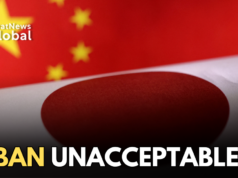NEW DELHI: Crystal ball gazing into a post-Covid-19 world, the Australian high commissioner-designate to India Barry O’Farrell has said that while he sees the US playing a far more cautious role in terms of exercising global leadership, he sees India as a major “natural power in the region”, playing an enormous role in shaping the post-COVID world.
Elaborating, O’Farrell said, “ It’s well placed to do this as one of the very few economies currently expected to emerge from this crisis not in recession.”
He made these observations while sharing his views on the geopolitics of the Indo-Pacific as well as India-Australia relations at the National Defence College (NDC) via a teleconference here on Wednesday. O’Farrell said, “I see even faster shifts in the Indo-Pacific power balance, with an associated sharpening of strategic competition. And an even more factious multilateral system.”
While the US-driven Indo-Pacific construct is largely seen as being aimed at countering China, those allying with Washington on this (India included) have largely chosen to downplay this aspect. However, O’Farrell’s speech made it clear that Chinese dominance in the Indo-Pacific region remains a matter of concern. Without naming China he drew attention to the fact that, “Across the Indo-Pacific we are seeing increasing strategic competition driving exploitation of some of the more fragile developing states.”
He also referenced China’s increasing attempts at strategic dominance in the region noting, “ In the race to secure economic and strategic advantage through port access and military reach, great power rivalry is testing state sovereignty of our more vulnerable regional partners.”
Noting that southeast Asia is “core to our concept of the Indo-Pacific,” O’Farrell said, “ We expanded cooperation with southeast Asia on maritime issues, including on maritime law, maritime domain awareness and strengthening civil maritime organisations … all of which was designed to strengthen a rules-based maritime order.”
China is accused of violating this rules-based maritime order in the South China Sea, where it has claimed and occupied disputed islets, raised artificial islands and fortified them.
O’Farrell referred to China’s inroads into the Indian Ocean region. “We also have great ambition for the India-Australia relationship to strengthen the security and stability of the Indian Ocean region.”
The HC-designate made it clear that Australia “looks to it (India) as a strategic partner with complementary interests.” He undescored that New Delhi and Canberra’s strategic interests converge in the Indian Ocean Region, “ We both have significant Indian Ocean coastlines, strategic island territories, highly capable military reach and valuable trade routes across the Indian Ocean,” he said describing cooperation between the two countries in this regard as a “natural fit”.
He noted, “India represents a major power without some of the baggage that others can bring”, pointing to Delhi’s “traditionally non-aligned stance and its deep cultural and religious links to the region”.
He suggested that India and Australia could build on the trilateral maritime security workshop they had held with Indonesia last year to identify ways “to be the best custodians of the Indian Ocean.”
O’Farrell said his country supported India’s leadership of the IORA (Indian Ocean Rim Association) as “it helps to shape it into a genuinely norm-building entity.”
Professional newshound, have navigated through typewriters, computers and mobile phones during my over three-decade-long career working in some of India's finest newsrooms (The Times of India, Financial Express). Pakistan, Nepal, Bangladesh and Bhutan are my focus, also Sri Lanka (when boss permits). Age and arthritis (that's a joke) have not dimmed the thrill of chasing a story. Loves music, animals and pasta.





